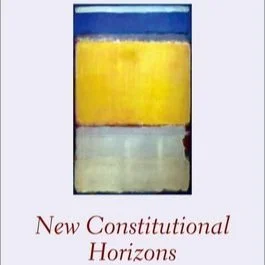Author Interview: New Constitutional Horizons: Towards a Pluralist Constitutional Theory
/Cormac Mac Amhlaigh
Edinburgh Law School
Cormac Mac Amhlaigh tells us about his new book ‘New Constitutional Horizons’
Tell us a little bit about the book
The book puts forward a pluralist theory of constitutionalism by gathering together some of the key questions that a pluralism of constitutional systems resulting from legal globalization raises for our understanding of constitutions and constitutional theory. It tries to open up constitutional theory to account for that pluralism.
What inspired you to take up this project?
This may come as a surprise, but I never intended to write a book about constitutional pluralism! I was interested in the idea of non-state constitutionalism and the various ways in which legal globalization posed challenges for constitutional law and constitutional theory. Looking into these issues, a series of questions started to jump out at me to which I hoped to quickly find satisfactory answers. However, the more I searched the less answers I seemed to find and I was increasingly dissatisfied with the kinds of solutions that were proposed so I set about developing my own.
Whose work was influential on you throughout the project?
To quote the old cliché that we stand on the shoulders of giants, the core canon of constitutional and legal pluralism was formative for me in learning about the area (MacCormick, Walker, Kumm, Maduro, Michaels, Krisch, Baquero-Cruz, Tamanaha, Twining, Teubner) as was the standard canon of anglophone analytical legal theory (Kelsen, Hart, Raz, Dworkin). However, the work of Julie Dickson, Nicole Roughan, and Keith Culver and Michael Giudice challenged me in ways I hadn’t previously experienced and forced me to approach these questions in a (for me) radically new way which had a major influence on the way the project developed.
What challenges did you face in writing the book?
The usual ones – time, other work and personal commitments as well as the general challenges of trying to contribute to a very crowded and dense field. (I faced a lot of scepticism about what I was trying to do during the earlier stages of the project.) However, the main challenge I faced was trying to clearly articulate my own dissatisfaction with some of the solutions to legal and constitutional pluralism and figuring out what I thought about the questions and solutions. The book took me a long time to write – I’d been working on the ideas for almost 10 years - and the majority of this time was spent trying to figure out the precise questions that legal globalization posed for constitutional theory and how we might productively go about resolving them. I often say that in doing research we really do face the final frontier – i.e. ourselves – in the sense of trying to discover what we honestly and authentically think about something.
What do you hope to see as the book’s contribution to academic discourse and constitutional or public law more broadly?
I hope it makes a contribution to the field of constitutional pluralism. However, I hope it also makes a contribution to more general questions in legal and constitutional theory, particularly how we understand law and legal systems in a context of legal pluralism, how to best understand disagreements in constitutional theory, as well as how the concept of constitutionalism can help us make progress on the many constitutional problems we face in the world today.
What’s next?
I mentioned that it has taken me almost 10 years to write this book and I would now like to get on with my life and talk about other things not related to constitutional pluralism. However, I’ve been reliably informed that this is impossible so I guess I’ll be discussing some of these issues for the next couple of years. However, what excites me at the moment in terms of research is a new project I’m devising on a democratic constitutional theory. In this project I’m keen to trace the relationship between our core ideas of constitutional law (rule law, separation of powers, fundamental rights etc.) and the concept of democracy. One of the core ideas of the project is that constitutional theory has developed in the absence of a robust conception of democracy and a clear sense of how it fits into our received frameworks of constitutional law. Part of this project is aimed at advancing a constitutional theory of democratic civic education and trying to convince constitutional lawyers (particularly in the academy) that we need to take democratic civic education more seriously. The project draws in a number of popular themes in contemporary constitutional law including populist authoritarian constitutional reform and the various challenges to liberalism which have emerged over the past decade or so.
Cormac Mac Amhlaigh is Senior Lecturer in Public Law at Edinburgh Law School
‘ New Constitutional Horizons: Towards a Pluralist Constitutional Theory’ is available at Oxford University Press. For a 30% discount, apply this code ALAUTHC4 at the checkout.
Suggested Citation: Cormac Mac Amhlaigh, ‘New Constitutional Horizons: Towards a Pluralist Constitutional Theory’ IACL-AIDC Blog (1 June 2022) https://blog-iacl-aidc.org/just-published/2022/6/1/author-interview-new-constitutional-horizons-towards-a-pluralist-constitutional-theory.


